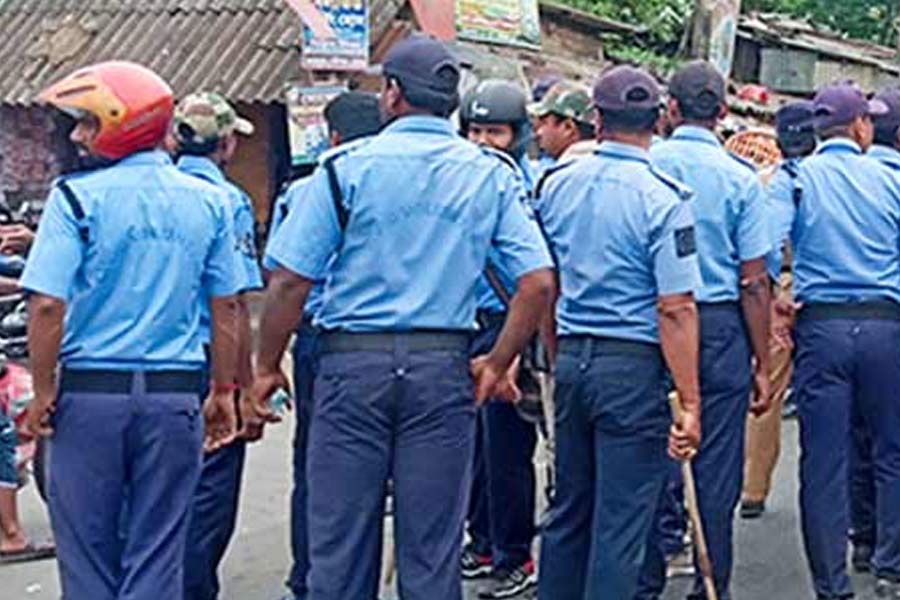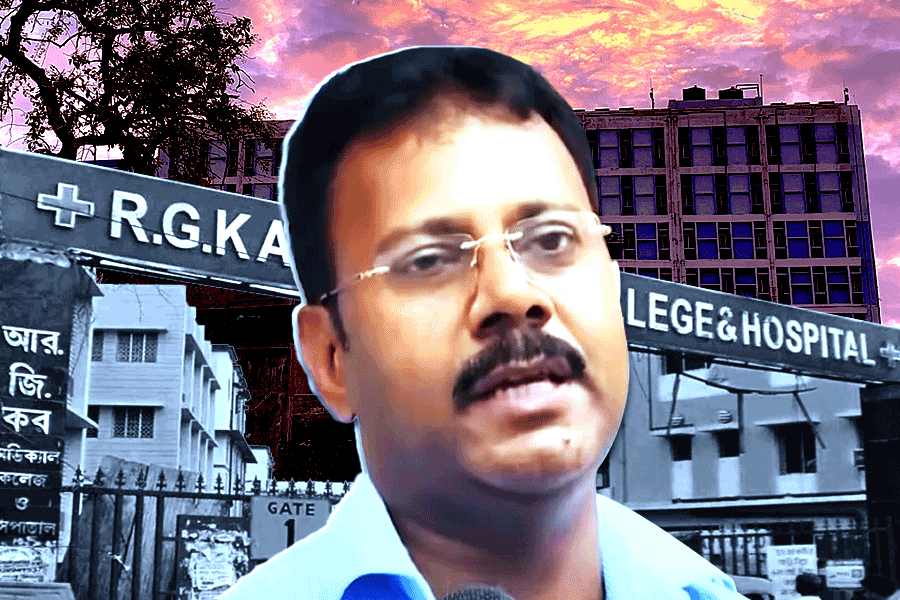Supreme Court Justice J.B. Pardiwala is not the only one flummoxed by the procedure followed by the police in Calcutta on the day the body of a young doctor was found in RG Kar Medical College and Hospital.
A number of retired IPS officers who have served in top positions in the police force in Bengal, Calcutta and elsewhere have told The Telegraph Online under strict condition of anonymity that there is “something peculiar” about the chain of events after the police were informed.
“What was the need to rush with the post-mortem that very evening? Why was it conducted without any FIR? I have never seen any case handled in this manner. This is not how a murder case is investigated,” said a retired IPS officer.
His words almost mirrored Justice Pardiwala’s, who said he had “never seen something like this” in his 30-year legal career.
Both Calcutta High Court and the Supreme Court have raised questions regarding the timeline of events since the victim was found at the seminar hall of the RG Kar Medical College and Hospital’s chest department on the third floor of the emergency building.
Establishing a murder case where there are no eye-witnesses is a Herculean task as most of the case would depend on circumstantial evidence that has to be supported by scientific evidence, the retired IPS officer who spoke to The Telegraph Online said..
The Calcutta police’s Special Investigation Team that was probing the case till the Calcutta High Court handed over the investigation to the CBI arrested a civic volunteer, Sanjay Roy, who worked at the hospital.
Though the police had claimed that he had confessed, during his polygraph test conducted at the Presidency correctional home on Sunday, where he is currently housed, the accused reportedly said he was innocent.
When he was produced before a local court before the polygraph test, he reportedly said he was innocent and was being framed.
The former IPS officers who spoke to The Telegraph Online raised a few critical questions that according to them the investigating agencies should have or should be looking into.
“The one arrest that has been made in this case is on the basis of a Bluetooth headphone that was found in the room,” a retired police officer said. “That can only prove that he was present inside that room at some point of time. It does not prove that he is the person who committed the rape and murder.
“There are other ways to establish that,” the officer said. “The fluids found on the victim; have they been matched with the accused? If she had resisted, tissues would be found under her nails. Have those been matched? It is said that the accused used the same vehicle to leave the hospital. It is quite possible some evidence like semen or blood had been transferred to the vehicle. Has the vehicle been tested?”
The post-mortem report of the victim – a copy of which The Telegraph Online has seen – mentions a “white thick viscous liquid present inside endocervical canal”.
Another question the IPS officers raised was about the scene of crime.
“Given the fact that such a heinous crime took place, whether committed by one or more, the scene of crime looks too undisturbed. If such an act – a violent rape and murder – was carried out there, the place could not remain undisturbed. Answers to these questions are not clear,” said one retired IPS officer.
Bengal’s counsel in the Supreme Court, Senior Advocate Kapil Sibal, told the three-member bench of the Supreme Court led by the Chief Justice of India D.Y. Chandrachud that the Calcutta police had followed the prescribed procedure in such cases to the ‘T’.
The IPS officers we spoke to feel otherwise, specially on the delay in the filing of the FIR.
Sibal admitted in the Supreme Court last week that the FIR was filed by the father of the victim at 11.45 pm of August 14, almost 14 hours after the trainee doctor’s body was discovered at the seminar hall. The hospital authorities had initially described – when they alerted the cops – the incident as a person being found “unconscious”.
The Supreme Court bench had pointed out to Sibal that it was the duty of the hospital to file the FIR.
“The sub-inspectors who must have visited the spot would have had at least 15 years of experience and could have easily deciphered from the injury marks and the bleeding that this was a homicide case,” said an IPS officer who retired not so long ago.
“For rape to be established, a post-mortem report is necessary. From whatever information has been revealed so far, the injury marks on her private parts were visible and inference could have been drawn,” the officer said.
Like the Calcutta High Court and the Supreme Court, the delay in filing the FIR has baffled the retired IPS officers.
“According to Section 154 of the old Code of Criminal Procedure, the responsibility rests with the officers-in-charge in case of any cognisable offence. There are no ifs and buts about it,” said a former IPS officer.
Section 154 of the CrPC states that every information relating to the commission of a cognisable offence, if given orally to an officer-in-charge of a police station, shall be reduced to writing by him or under his direction.
“It is surprising that neither the college authorities nor the three doctors who were with her or the one who saw the body first took the responsibility of filing the FIR,” the retired IPS officer said.
If a murder or an unnatural death is recorded, the task of the first officers on the spot is to secure the crime scene, inform the forensic team, ensure a team of photographers from the Detective Department arrive and the “surat-haal” or the position in which the body was found is recorded. Only then comes the inquest.
“This was the duty of the local police and they do not seem to have done it properly,” said a retired officer.
Some of the experts feel the investigation has been too focused on the one accused, the civic volunteer Sanjay Roy, who has reportedly denied his confession.
“The scope of the investigation should have been widened. Making one arrest cannot be enough in such a serious crime,” said a former IPS officer. “The possibility of others being involved should have been considered seriously.”













